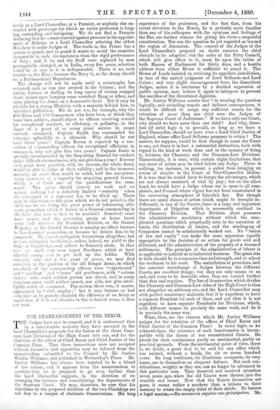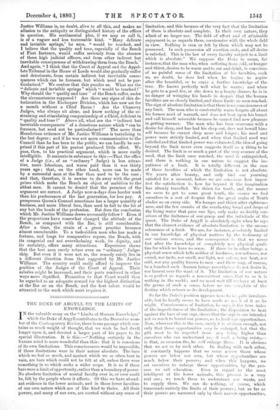THE REARRANGEMENT OF THE BENCH. experience of the profession, and
the fact that, from his recent elevation to the Bench, he is probably more familiar than any of his colleagues with the opinions and feelings of the Bar, are further reasons for giving his views a respectful consideration. Nor can the question be yet regarded as beyond the region of discussion. The consent of the Judges to the Lord Chancellor's proposal no doubt removes the chief obstacle to its adoption ; but the order of the Privy Council, which will give effect to it, must lie upon the tables of both Houses of Parliament for thirty days, and a hostile address from either House is sufficient to annul it. The House of Lords insisted on retaining its appellate jurisdiction, in face of the united judgment of Lord Selborne and Lord Cairns ; and very slight encouragement from the dissentient Judges, unless it is overborne by a decided expression of public opinion, may induce it again to interpose to prevent the sacrifice of the threatened dignities.
Mr. Justice Williams asserts that "in treating the question logically, and excluding remote and indirect consequences, it would be difficult to assign any sufficient reason for the retention of more than one chief over the Judges of the Supreme Court of Judicature." If we have only one Court, why should we have more than one chief ? And why, there- fore (if strict logic is to prevail), so long as we have a Lord Chancellor, should we have even a Lord Chief Justice of England, whose office Lord Selborne proposes to retain? The answer, we suppose, would be that though in name the Court is one, yet there is in fact a substantial distinction, both with regard to the kind of work done and to the manner of doing it, between the Chancery and the Common-Law Divisions. Theoretically, it is true, with certain slight limitations, that
any cause of action may be tried before any Judge. There is nothing, for instance, to prevent a suitor from bringing an
action of slander in the Court of Vice-Chancellor Malins. It is true that he would have to forego the advantages which are not always unmixed, of trial by jury; but on the other hand, he would have a Judge whose ear is open to all com- plaints, and Counsel whose vigour has not been emasculated in the enervating atmosphere of Lincoln's Inn. But though there are many classes of action which might be brought in- differently in any of the Courts, there is a large and important department of litigation which is necessarily confined to the Chancery Division. That Division alone possesses the administrative machinery without which the com- plicated questions which perpetually arise in the execution of trusts, the distribution of estates, and the winding-up of Companies cannot be satisfactorily worked out. No "fusion of law and equity" can make the same apparatus equally appropriate to the decision of an action for goods sold and delivered, and the administration of the property of a deceased millionaire. The principle of the administration of labour is as applicable to judicial as to industrial business. The great aim in both should be to economise time and strength, and to adjust the workman to his work. The assimilation of procedure, and the constant interchange of Judges between the different Courts, are excellent things ; but they are only means to an end, and cease to be desirable when they are carried further than that end requires. The line of demarcation which divides the Chancery and Common-Law sides of the High Court is thus not altogether an arbitrary one, and the Lord Chancellor may with perfect consistency maintain that it is expedient to have a separate President for each of these, and yet that it is not expedient to have separate Presidents for Divisions, which, with different names, do precisely the same work, and do it in precisely the same way.
What, then, are the reasons which Mr. Justice Williams assigns for the retention of the offices of Chief Baron and Chief Justice of the Common Pleas ? In strict logic, as he acknowledges, the existence of such functionaries is incom- patible with the theory of our reconstituted Courts. He pleads for their continuance partly on sentimental, partly on practical grounds. From the sentimental point of view, there is, no doubt, a great deal to be said for any office which has existed, without a break, for six or seven hundred years. Its long traditions, its illustrious occupants, its very name, are in themselves an eloquent defence. But such con- siderations, weighty as they are, can no longer be advanced in this particular case. They deserved and received attention
seven years ago, when the old Courts were thrown into the
crucible and recast. Now that the Courts themselves are gone, it seems rather a mockery than a tribute to their
memory to retain the empty titles of their chiefs. To borrow a legal maxim,—Res accessoria sequitur rem principakm. Mr.
Justice Williams is, no doubt, alive to all this, and makes no allusion to the antiquity or distinguished history of the offices in question. His sentimental plea, if we may so call it, is of a vaguer and less traversable kind. "Many delicate and invisible springs," he says, "would be touched, and I believe that the quality and tone, especially of the Bench of First Instance, would suffer seriously from the absence of these high judicial officers, and from other indirect but inevitable consequences of withdrawing them from the Bench." And again, "I think that the Court of Appeal and the Appel- late Tribunal in the House of Lords would also gradually suffer and deteriorate, from certain indirect but inevitable conse- quences which can be foreseen, but which need not be par- ticularised." We confess that this puzzles us. What are the "delicate and invisible springs" which" would be touched I" Why should the "quality and tone" of the Bench suffer, under the circumstances supposed? Are there any signs of this de- terioration in the Exchequer Division, which has now sat for a month without a Chief Baron ? Are the Chancery Judges, who always sit alone, and know nothing of the re- straining and stimulating companionship of a Chief, deficient in "quality and tone ?" Above all, what are the "indirect but inevitable consequences" of a disastrous nature which "can be foreseen, but need not be particularised ?" The more than Herodotean reticence of Mr. Justice Williams is tantalising to the last degree ; and if he was not more communicative to the Council than he has been to the public, we can hardly be sur- prised if this part of his protest produced little effect. We pass, then, to his practical argument, which is more easily intelligible. It amounts in substance to this :—That the office of a Judge (i.e., of an " ordinary " Judge) is less attrac- tive, more laborious, and worse paid than it was thirty years ago ; that, on the other hand, more can be made by a successful man at the Bar than used to be the case; and that, therefore, it is unwise to do away with the great prizes which make the Bench an object of ambition to the ablest men. It cannot be denied that the premises of the argument are correct. A Judge now-a-days does harder work than his predecessors of the last generation, for less pay. A prosperous Queen's Counsel sometimes has a larger quantity of business, and more liberal fees, than used to fall to the lot of any but the heads of the profession. But does the conclusion which Mr. Justice Williams draws necessarily follow ? Even if the proportions have somewhat changed the altitude of the Bench, as compared with the Bar, is still considerable. After a time, the strain of a great practice becomes almost unendurable. To a task-ridden man who has made a fortune, and longs for comparative repose, the Bench, with its congenial and not overwhelming work, its dignity, and its certainty, offers many attractions. Experience shows that the best men rarely refuse even an " ordinary " Judge- ship. But even if it were not so, the remedy surely lies in a different direction from that suggested by Mr. Justice Williams. The country could easily afford to improve the position of the Judges of the Court of Appeal. Their salaries might be increased, and their posts rendered in other ways more dignified. Promotion to that Court would then be regarded as an adequate reward for the highest distinction at the Bar or on the Bench, and the best talent would be attracted to the work which most requires it.







































 Previous page
Previous page